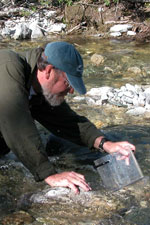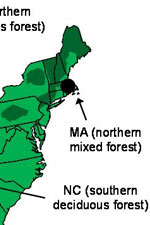 |

For further information, contact the MBL Communications Office at (508) 289-7423 or e-mail us at comm@mbl.edu
Embargoed until 2 pm (EST), March 12, 2008
Contact: Gina Hebert, 508-289-7725, ghebert@mbl.edu
Increasing Nitrogen Pollution Overwhelms Filtering Capability of Streams
Nationwide study says excess nitrogen loading reduces pollution-filtering efficiency of stream and river networks
MBL, Woods Hole, MA—Increasing nitrogen runoff from urban and agriculture land-use is interfering with our streams’ and rivers’ natural processes for reducing this pollutant before it endangers delicate downstream ecosystems, reports a nationwide team of 31 ecologists, including two from the MBL (Marine Biological Laboratory) Ecosystems Center....More>>>
Resources
Citation:
Mulholland, Patrick J. et al. Stream denitrification across biomes and its response to anthropogenic nitrate loading. Nature, 13 March 2008, Vol. 452, Issue 7184, 202-205.
For full text of this paper, please contact press@nature.com.
Photos: Click on thumbnails for full images
 |
 |
 |
 |
Bruce Peterson
Peterson Lab
|
|
Patrick Mulholland
Mulholland Lab
|
|
|
|
|
|
 |
|
 |
|
| MBL Ecosystems Center senior scientist Bruce Peterson peers through a viewfinder at the bottom of a stream. Credit: Laura Broughton |
|
Study map |
|
Links:
MBL Ecosystems Center
Oak Ridge National Laboratory
Background: Streams and Nitrogen Reduction
Ecologist Available for Comment:
Sybil Seitzinger, Ph.D.
Institute of Marine and Coastal Sciences, Rutgers University; sybil@imcs.marine.rutgers.edu; 732-932-6555, ext. 342
Funding:
National Science Foundation
|